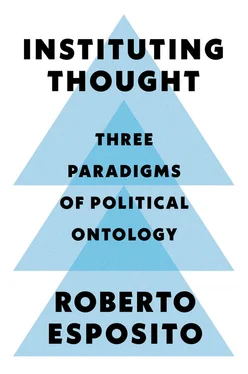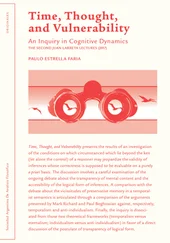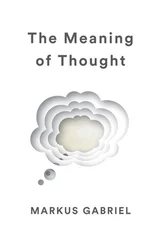2. Tracing the first ontologico-political paradigm – which is oriented toward the deactivation of action, and therefore also definable as a “destituting” paradigm – back to Heidegger is neither a foregone conclusion nor one devoid of problems. This is not only because he never claimed to be a political thinker, not even in the dark period of his rectorate, but also because all contemporary philosophers who, in various ways, could be ascribed to the destituting paradigm are situated in a political orbit that is radically counterposed to Heidegger’s. And yet, this very clear distance in political orientation notwithstanding, all of them, from Schürmann through Nancy to Agamben, consider him an essential theoretical point of reference. In this respect the same paradoxical relationship that had tied Heidegger to his great Jewish disciples – Marcuse, Arendt, Löwith – repeats itself. In this case, too, naturally, each of the philosophers I mentioned follows his or her own original path, in which references to Heidegger alternate with just as frequent ones to Bataille, Benjamin, and Foucault. And yet the traces left by Heidegger in their thought remain indelible. How come? What paradigmatic thread ties intellectuals of the extreme left to a thinker whose political orientation was always toward the right? In order to answer this question – which has made people use the phrase “left Heideggerianism” – one needs to look at Heidegger not from the perspective of his inauspicious political commitment in the 1930s – a perspective that is all too much in evidence today – but rather from that of the impolitical turn that succeeded it, and in ever more pronounced forms, from the postwar period to the 1960s.
The following pages provide a fairly detailed account of Heidegger’s itinerary, reconstructing the transitions and the discontinuities of a grand thought that ever more clearly modifies its conception of politics. These are pages that never elide the profound connection to the theoretical center of gravity of his work as a whole, represented by the “negative” dispositif of ontological difference. From this angle, one can even trace an obviously imperfect parallel between ontological difference and the political–impolitical bipolarity. In both cases the relationship is characterized, and constituted, by a negation. Just as alētheia is recognizable only in the negative modality of “non-concealment,” analogously politics originates negatively from an impolitical presupposition that both founds it and defies it. Having originated from something non-political – the impolitical site of the polis – politics is not able to correspond to it with a sufficient degree of radicalism. The complex equilibrium that still allowed Heidegger in the 1930s to imagine the instituting of the political, even if by thinkers and poets, breaks at some point, projecting the two poles, the political and the impolitical, in ever more divergent directions. When this happens, the impolitical – understood, up to a certain moment, as the negative foundation of politics – becomes its absolute negation. This is the case when politics – any type of politics, including that to which, in the early 1930s, Heidegger had entrusted the task of saving the West from the anti-metaphysical grip that was strangling it – appears to him to be incorporated and perverted by technological Machenschaft [machination], a legacy contemporary to the Romanization of the Greek language. That is when, having lost its contacts with an ever more degraded politics, the impolitical expands to the point of occupying the entire ontological horizon, clearly separating itself from the destiny of humankind. From this point on, the only way for humans to respond to that which calls them is to deactivate their action, ready to listen to a poeticizing or meditative thought.
All of Heidegger’s work, starting in the early 1940s, revolves around this destituting paradigm. That which was conceived as the negative presupposition of all political institutions and of instituting itself now becomes its very clear rejection. Politics, which at this point has been entirely absorbed by technology, should no longer be instituted, but destituted. Any kind of “doing” should be undone. Only the radical tonality, the decisive lexicon related to taking a decision, is what remains of the political – a decision that now coincides with a non-decision, one that corresponds to the oxymoron of the will to not will. But, once all political possibilities have been voided, even the impolitical, deprived of its original foundational power, ends up annihilating itself. If the impolitical is thought of as the source of the political, when the latter implodes into technology, the impolitical ends up sliding into nothingness aswell. Once the political has been annihilated, the impolitical, deprived of a point of contrast, sinks with it. Insofar as human beings are concerned, since they are ontologically prevented from transforming reality, they can only wait for the fulfillment of destiny. What is striking in Heidegger’s language is the activist tone taken by that which one can subject oneself to only in a passive manner: the non-postponable nature of the ultimate option that continues to suggest the category of potentiality – but only so long as it remains unrealized, sheltered from an activity that, in realizing it, would empty it. It is this impolitical intensity of the deactivation of all politics that post-Heideggerian thinkers absorb from Heidegger, transposing it, in similarly radical fashion, into a horizon that is as theoretically revolutionary as it is practically inert.
One needs to add that the Heideggerian roots of this destituting line are not the only ones. At its origin, not always fully consciously, lies a paradigm that in its day was defined as impolitical, inscribed on the reverse of the official side of twentieth-century philosophy. I am thinking of authors who were not professional philosophers, such as Karl Barth, Simone Weil, Georges Bataille, Hermann Broch, Elias Canetti. They are the first to coin the, elevated and tragic, language of dis-activation: from “decreation,” to “passive action,” to “non-agent,” “not translated into act,” “decreation,” “blocked at the stage of pure potentiality.” The entire lexicon of the destituting paradigm was born between the 1920s and 1930s and was then resemanticized at the end of the century. At its center we find a negative presupposition – expressed by the prefix in im-political – which excludes any affirmative judgment. In this world one finds nothing but conflicts of power and interest, separated by an invisible line from what is not and will never be able to be. The impolitical is not something situated beyond it, that does not exist as such, but that invisible line itself. It accomplishes nothing but express the impossibility of representing goodness, justice, and value politically. But the impolitical, in turn, cannot escape the contradiction of being able to define itself only on the basis of the political, from which it distances itself. It is this insurmountable antinomy that places it on the same slim ridge that both conjoins and disjoins gnosticism and mysticism, pushing one into the reverse of the other. That which ultimately remains, notwithstanding everything that distinguishes individual interpreters from one another, is the shared depoliticizing outcome that the entire paradigm of deactivation produces. Removed from any perspective oriented toward action, protected from the temptations of work, bent on the anarchical removal of principles, it dissolves the possibility of the political in the as yet unrevealed enigma of a potentiality devoid of act.
3. The ontologico-political paradigm whose influence is most strongly felt in Deleuze’s works is antipodal to the post-Heideggerian paradigm. Deleuze himself, while recognizing Heidegger’s philosophical stature, views his own oeuvre as a sort of confutation of the latter’s. While they both share a number of themes, what sharply separates them is the plane, which Deleuze himself defines as one “of immanence,” that is in principle destined to abolish all kinds of ontological difference. Since being is univocal, in other words constituted in the unique form of difference, instead of being separated from an ontic dimension, difference coincides with the becoming of being itself. Without dwelling on the transitions that lead Deleuze to elaborate this plane of immanence, we can state that its effect is the exclusion of the notion of the impolitical itself, a notion that, on the other hand, Heidegger’s political reflections do revolve around. Once the negative presupposition of the political has been suppressed, the latter expands to the point of filling the entire movement of reality. This is what Deleuze argues, at least starting from 1968; and this period is identified, not only by him, as the period in which the realization of the political and the politicization of the real resolve into each other without residue. From this perspective the French philosopher’s work – especially the Anti-Oedipus and A Thousand Plateaus – can be seen as the most intense political ontology of the twentieth century, in other words a work in which the two terms, ontology and politics, experience the highest degree of superposition, one that frontally collides with the irremediable fracture Heidegger opened between them.
Читать дальше












